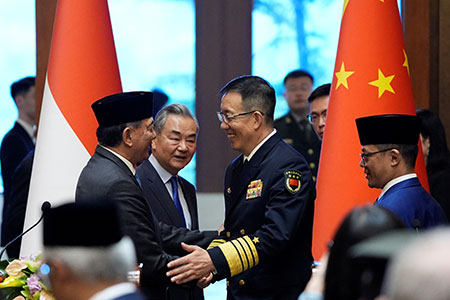
For the first time, a 2+2 meeting was held in Beijing between the Foreign and Defense ministers of China and Indonesia. The parties stated that they would jointly take care of security in the South China Sea (SCM). This means that their ships will avoid collisions in the territorial dispute, similar to those between China and the Philippines, which are supported by the United States. Beijing also called on Jakarta to jointly resist the tariff war unleashed by Washington.
Indonesia has long been suspicious of China’s actions in the waters surrounding it, the AP news agency reports. China actually claims control over the entire South China Sea. And his coast guard vessels often approached the Middle Natuna archipelago, which Jakarta considers its land. Although neither side mentioned the islands directly, Chinese Foreign Minister Wang Yi said there was an understanding to raise security cooperation to a comprehensive level. After all, maintaining peace and stability is in the interests of all countries.
What does this formulation mean in practice? One can make various guesses about this. But from Wang Yi’s explanations, it can be concluded that an agreement has been reached (a memorandum of understanding has been signed) between the coast guard services of the two countries. Presumably, they will not ram each other with their ships or board the enemy, as sometimes happened between the sailors of China and the Philippines. The Philippine naval commanders are behaving so decisively because Washington has promised to stand up for them. Moreover, this promise was made by the administration of former President Joseph Biden. And the administration of President Donald Trump is acting in the same way.
Indonesia is washed by the waters of the Pacific and Indian Oceans, through which, according to experts, $5 trillion worth of cargo is transported annually. But Indonesians have to be less nervous than the other six countries, such as the Philippines, Vietnam, and Malaysia. These countries are involved in a direct conflict with the PRC due to mutual claims to the right to use the exclusive economic zone of 200 nautical miles. The Chinese are more gentle with the Indonesians, despite the fact that the Indonesian Coast Guard sometimes displaces or even detains Chinese fishing schooners. In short, the differences have not been completely resolved, and Jakarta is aware that the Middle Natuna archipelago is included in the maritime space, which is marked with strokes on Chinese maps as controlled by China.
Last year, Indonesian President Prabowo Subianto visited Beijing, and this helped reduce tensions. It is no coincidence that Chinese Defense Minister Admiral Dong Jun said after the 2+2 meeting that an agreement had been reached to step up communications, as well as to conduct joint counter-terrorism maneuvers later this year.
Pirates are operating in the South China Sea, especially in the part of it that is close to Indonesia. They are repainting captured vessels in countless Indonesian ports, giving them new names, and giving them new electronic identification.
The Indonesian negotiators also spoke positively about the outcome of the meeting, wanting to mitigate the differences. Foreign Minister Sugiono (Indonesians often use only one name) said the two powers are aligned in the fight against terrorism, extremism and transnational crime in the region. Sugiono also indicated that Indonesia will open a consulate in Chengdu, China.
There is one caveat here. The example of Jakarta shows how skillfully Beijing prevents its opponents from uniting in the South China Sea. As with Indonesia, China negotiates with each country individually, often softening its rhetoric.
Economic ties between the two countries have also grown rapidly in recent years. China has become Indonesia’s main trading partner, investing heavily in infrastructure projects such as a high-speed railway between Jakarta and Bandung and a floating solar-powered power plant. However, not everything is going smoothly in economic relations. There are disputes about the cost of projects. But Beijing is firmly pursuing Chinese President Xi Jinping’s Belt and Road initiative, which provides for massive investments in Southeast Asia.
And during this period, after Trump launched a tariff war against China, Beijing raised the issue categorically with its trading partners.: Are you with us or the Americans? And nothing good awaits those who are ready to make concessions to the United States. They may lose access to the giant Chinese market or experience a drop in Chinese direct investment in their economy. This topic did not officially appear at the talks in the capital of China. But Jakarta has a lot to think about.
In an interview with NG, Alexey Drugov, Chief Researcher at the Institute of China and Modern Asia of the Russian Academy of Sciences, noted: “I think there has been no solution to the problem of disputed territories. But there is a mutual understanding that this problem does not hinder cooperation. Indonesia does not want to be dragged into the confrontation between China and America. Namely, the United States is trying to drag Indonesia into this conflict. But Indonesia is in a difficult position. She was forced to provide trade privileges to America, and this will harm China. After all, China and the United States are almost equal trading partners of Indonesia in terms of trade turnover. As a result, its exports and imports with America will increase, while with China and other countries it will decrease.”
As for the interaction of the Navies of the two countries, they will be able to conduct joint maneuvers, the expert believes. But it is still difficult to say how far this cooperation will go.
